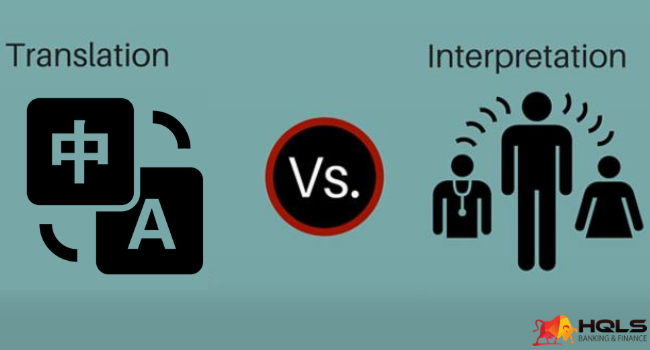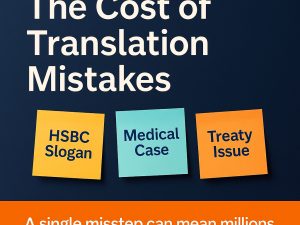
It’s easy to use the terms “interpretation and translation” interchangeably. Perhaps, it’s because they’re as similar as any two words could be. Without having the full knowledge of what these terms mean, you could always lump interpreters and translators in the same group although they are fundamentally different.
The difference between translation and interpreting seemingly similar terms don’t exist only in the skills needed by both to carry out their work but also in the medium used.
To this end, a professional interpreter is hardly ever able to do the work of a professional translator. While it seems absurd because the end goal, which is passing information from the source language to the target language, is achieved, there are basic differences that make this impossible.
Note : HQ Language Services is one of the world’s leading & Best financial Translation Services providers
Before we fully look at the duties and skills set of the interpreter Vs translator, let’s define both terms…
Interpreter
A professional interpreter is someone who listens to and translates oral communication from the source language to the target language. An interpreter needs to have an in-depth knowledge of the target language, including idioms and colloquialism.
He or she should also develop an excellent memory and have good background knowledge of the subject being discussed.
There are two types of interpretation Services
- On-the-Spot/ Simultaneous Interpretation
The simultaneous interpreter translates the oral communication in the target language on the spot. They have to be great listeners who can multi-task. This is because they interpret the sentence spoken a few seconds ago while listening to the speaker and trying to translate the currently spoken sentence.
2. Consecutive Interpretation
The consecutive interpreter translates oral communication in paragraphs and groups of sentences rather than sentence after sentence as the simultaneous interpreter does. He has to develop a keen memory to be successful at this as he has to memorize full paragraphs and translate them with almost perfect efficiency.
Translator
A professional translator is someone who converts written text from its source language to the target language. There are many different types of translation services, and they include:
- Financial Translation
- Technical Translation
- Judicial Translation
- Scientific Translation
- Legal Translation
- Literary Translation
Each of these translation services has its pros and cons. But the most difficult of them is a translation.
Indeed, the differences that lie between the duties of the interpreter Vs translator are on the medium of translation and skill set. The only similarity lies in the fact that both sides aid communication by converting one language to another.
Difference between translation and interpreting
- Target Language proficiency
While both sides should have a good grasp of what the target language is, the level of proficiency needed is not the same.
For a translator, the level of language proficiency is always less than what is required of the interpreter. Translators have to understand expressions such as idioms and the cultural norm of the area to translate efficiently.
The translator must be stellar at writing in the target language and understanding to a large extent, the target language. However, they aren’t required to be near perfect when it comes to orally articulating the target language.
That fort is for the interpreters who need to not only be fluent but also have an in-depth, all-encompassing understanding of the nuances and colloquial expressions.
When it comes to down to whose skill set requires a better understanding of the target language, the interpreter wins without effort.
2.Accuracy of Translations
In a match of accuracy between the interpreter and translator, the translator dominates. If you think it through, you’d agree that interpretation requires less accuracy and less time. When trying to interpret what the first speaker has said, the interpreter might have to paraphrase or use words that convey the general idea of the conversation.
In the end, the interpreter has done his job provided the audience understands what the speaker is saying. Again the few seconds allowed for an interpreter to translate these words leaves room for little inaccuracies.
In translation, this vagueness and paraphrasing don’t come into play as much since most translators if not all translate into their native languages and have a good grasp of it. Again, the chances of having inaccuracies reduce vastly by the time allotted to each translation.
On principle alone, most translators have a great deal of time to work on the text they need to translate.
3. Background Knowledge on the Subject Matter
Between the interpreter and the translator, the interpreter needs more of background knowledge on the subject matter.
A translator’s work involves translating a document from one language to another. But it isn’t quite the same for an interpreter because it’s difficult to express an idea orally for others to understand if you don’t understand it yourself. Having background knowledge of the subject matter is a great skill all interpreters should have.
4. Public Speaking
One of the core skills of a competent interpreter is public speaking. Every interpreter should have the ability to address a bunch of people and make an impact on them by communicating. In terms of his job, a translator has no use for this skill. Most translators work from home and might not even be fluent speakers of the language.
5. Medium of Translation
This is the most apparent difference between the two. The interpreter translates oral communication from one language to the other.
On the other hand, the translator translates written text from one language to another language, which is usually their native language. While the interpreter has no need for tools except his mind, the translator makes use of books or electronic devices.
There you have it! Although closely related, there are clear differences between the interpreter and translator. Did we leave out any key difference, let us know in the comment section below!




